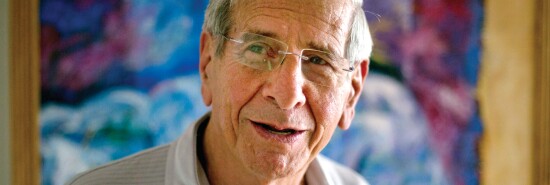
Chaim Topol, 1935-2023
Daniel Ross Goodman
Sholem Aleichem’s Tevye stories revolutionized Yiddish literature in the late-19th century. Tevye the Dairyman, as the collection of these innovative stories would be titled, helped pave the way for modern Yiddish writers such as the eventual Nobel Prize winner Isaac Bashevis Singer while also furthering the idea that Yiddish writings could be a veritable world literature on par with Russian, German, Italian, and French literature. As ironic as it may seem for a literature that we now think of as synonymous with “tradition,” it was Sholem Aleichem’s groundbreaking Tevye stories that helped endow the notably new literary language of Yiddish with the appearance of a tradition in the first place.
But as important as Sholem Aleichem had been to Yiddish literature, his Tevye stories likely never would have had the cross-cultural impact that his “Tevye” character achieved had it not been for the Israeli actor Chaim Topol’s portrayal of the famous fatherly character in the 1971 film version of Fiddler on the Roof.
The stage version of Fiddler on the Roof had opened on Broadway in 1964 to great acclaim, winning nine Tony Awards and turning its Tevye, Zero Mostel, into a star of the stage. But when the filmmaker Norman Jewison, who was fresh off directing the best picture Oscar-winning In the Heat of the Night, was looking to cast a Tevye for his film adaptation of Fiddler on the Roof, he shockingly zigged away from the popular Mostel and zagged toward the relatively unknown Topol. Topol’s only major film credit at the time was the 1964 comedy Sallah, which was about North African and Middle Eastern Jews trying to adapt to life in an Israel that was at that time peopled predominantly by Central and Eastern European Jews. Sallah won a Golden Globe for best foreign language film, was nominated for an Oscar in that same category, and netted Topol a Golden Globe for most promising newcomer — male (a now-defunct award category). The film helped establish Topol’s reputation as a skilled comic actor who could play characters much older than his actual age (Topol was in his 30s when he played the 60-something Sallah Shabati).
The movie also demonstrated that Topol, who died last week in Israel at age 87, could play Jewish patriarchs with a sense of profundity and poignancy but without the schmaltzy shtickiness Mostel mixed into his Fiddler on the Roof performances — exactly the kinds of qualities Jewison was looking for in his Tevye.
Topol was reluctant to take the part. But after he was persuaded to take it (learning English for the role), he proved that Jewison’s instincts were more than justified. Topol was nominated for a best actor Oscar for his Tevye, a performance of equal measure humor and heart, pride and pathos — and a performance of a character he ended up loving so much that he would go on to reprise his role of Tevye on the stage over 3,500 times, by his own count.
Topol was born in Tel Aviv to parents who had immigrated to Israel to escape the depredations of the Eastern European shtetl. Topol at first trained to be a printer, but while serving in the Israeli army, he became known for entertaining his fellow soldiers with such hilarious comic routines that he was placed in a special military entertainment unit. At the conclusion of his army service, he formed his own entertainment troupe, performed onstage in kibbutz theaters, and acted in Shakespeare, Brecht, and Ionesco plays in Haifa, Israel, before being cast as Sallah Shabati.
After the success of Fiddler on the Roof, Topol would go on to act not only in other theater productions of the play, but in a variety of films and TV shows as well, including the 1980 Mike Hodges movie Flash Gordon, the 1981 James Bond movie For Your Eyes Only, and the Emmy-winning 1983 TV series The Winds of War. But no part he played would ever compare to his singular achievement in Fiddler on the Roof, which was instrumental in conveying to audiences across the world (albeit in a romanticized fashion) some of the flavors of shtetl life, as well as a sense (albeit caricatured) of the burdens and joys of Jewish capital-T Tradition. At one point in his life, Topol rued the way his career had gone, wishing he had had other professional opportunities that were as fulfilling as Fiddler on the Roof. Marlon Brando, the Hollywood legend who had become identified in audiences’ minds with The Godfather in spite of several other high-profile roles, told Topol to consider his identification with Tevye as a fortune that few actors are ever so lucky as to even stumble upon — or, in Topol’s case, to have found him. After all, as Brando said to him, what more does an actor really need than “one movie in his pouch that’s a complete classic” than “one hit that becomes history”?
Daniel Ross Goodman is a Washington Examiner contributing writer and the author, most recently, of Somewhere Over the Rainbow: Wonder and Religion in American Cinema.
